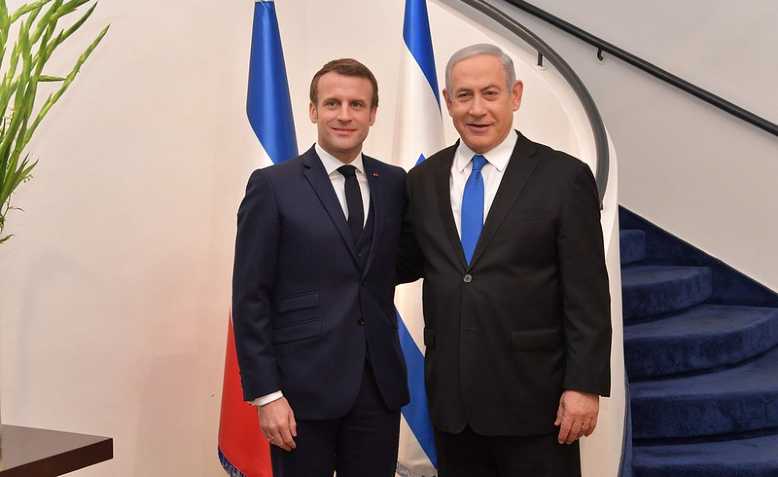 Macron meets Netanyahu. Photo: Israel Ministry of Foreign Affairs/cropped from original/licensed under CC2.0, linked at bottom of article
Macron meets Netanyahu. Photo: Israel Ministry of Foreign Affairs/cropped from original/licensed under CC2.0, linked at bottom of article
Defying bans and military-style policing, solidarity with Palestine is building across the country, reports Susan Ram
On May 15 – Nakba Day – thousands of protestors were on the streets in towns and cities across France to voice their support for Palestine.
More than 60 events, spanning rallies and marches, were staged across the country in what is emerging as France’s most comprehensive and geographically spread pro-Palestine mobilisation.
By most accounts, the largest gathering of the day was at Strasbourg, whether official estimates placed the number attending at more than 4,000. Large turn-outs were also reported at Marseille, Lyon, Toulouse and Nantes.
Beyond the numbers, two things were impressive about these demonstrations: firstly, their reach beyond urban metropolises to smaller towns and cities, and secondly the determination of people to get out there and express solidarity with Palestine, even in the face of official bans (as in Nice, Grenoble – and Paris).
Banning orders
In Paris, a coalition (collectif) of 34 organisations had been working – in step with the Paris authorities — on a major Nakba Day mobilisation in Barbès, a neighbourhood in the 18th arrondissement with a substantial North African population. The plan was that after assembling here, protestors would march to the Place de la Bastille — site of the emblematic prison whose storming, on July 14,1789, signalled the start of the French Revolution.
On May 12, a delegation headed by Bertrand Heilbronn, president of L’Association France Palestine Solidarité (AFPS) [ADD LINK: https://www.france-palestine.org/-L-AFPS-qui-sommes-nous-] attended a meeting at France’s foreign affairs ministry. Three MPs (deputés), including Elsa Faucillon of the French Communist Party and Sabine Rubin of La France Insoumise, formed part of the delegation. By all accounts talks went smoothly. But as the group left the building, police swooped to arrest Heilbronn – for the ‘crime’ of having organised an illicit gathering outside the ministry. Heilbronn was taken to a police station where he spent several hours handcuffed to a bench before being released.
This Kafkaesque episode was the prelude to a full-scale state operation to trample the prospect of Paris showing its support for Palestine into the mud.
The following day (May 13) Gérald Darmanin, Macron’s Interior Minister, announced that he had instructed prefects of police throughout the country to ban all Nakba Day mobilisations — on the grounds that ‘violence’ had erupted at similar pro-Palestine events back in July 2014. In Paris, the eminently biddable police prefect snapped his heels in his eagerness to comply. By the evening of May 13, demonstrating for Palestine on Nakba Day in one of the world’s major capital cities had been rendered illegal.
The willingness of Parisians to flout the ban and assemble as planned speaks to the combativeness and courage of the thousands who, despite threats of fines and ‘robust’ policing, nevertheless made their way to Barbès on the afternoon of May 15.
Military operation
Around lunchtime, Barbès residents were jolted by the deafening wail of massed police sirens. From windows and balconies they watched an endless cavalcade of security vehicles stream past: gleaming white water cannon trucks; innumerable police vans; a roaring tide of motorbikes, each with its heavily padded-out rider, replete with anonymising battle helmet.
As if spectators at a Hollywood movie, residents gaped as the alien invaders took up position along the quartier’s main boulevard and adjoining roads.
All nearby metro stations had shut their gates and all local shops and businesses, had been ordered to close from noon.
The French state then set about destroying any possibility of Paris joining other cities around the world in expressing solidarity with Palestine. High-pressure water cannon scythed through the protestors amid great surges of tear gas; riot police set to work with batons and high velocity ‘non-lethal’ weaponry, attacking with ferocity and impunity.
As one gendarme instructed his men, “Vous me dégagez tout ces connards!” (Clear away all these arseholes!)
There’s much that calls out for analysis in what happened in Paris on Nakba Day 2021. But for the moment, the images of the French state in action against those mobilising for Palestinian liberation carry their own special resonance. Across the country, considerable anger has been generated by this latest assault by the Macron government on people’s right to assembly. And amid that anger, solidarity with Palestine is on the rise.
Join Revolution! May Day weekender in London
The world is changing fast. From tariffs and trade wars to the continuing genocide in Gaza to Starmer’s austerity 2.0.
Revolution! on Saturday 3 – Sunday 4 May brings together leading activists and authors to discuss the key questions of the moment and chart a strategy for the left.

